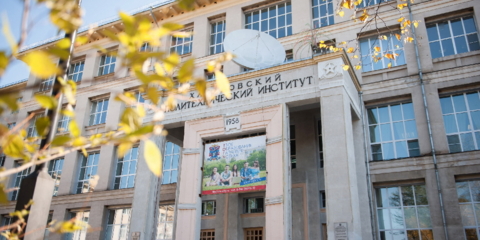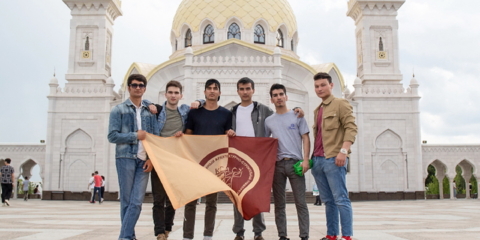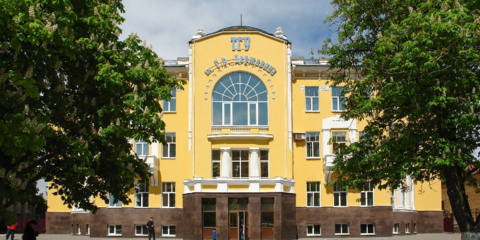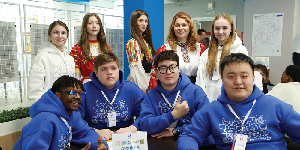Russian is the language of Pushkin, Tolstoy, Dostoevsky and many other writers that are so popular around the world. Learning Russian will help you easily integrate into the learning process, find new friends, discover the vast world of Russian culture, grow professionally.
The Kazan National Research Technological University staff members explain the issues the international students face while studying Russian and give useful advice for further learning.
Greeting and Adapting
After arriving in Russia, the first issues the students face are the language-related ones, stemming from lack or poor command of the Russian language. The senior students from the same countries take care of them and help them to settle down before the beginning of the classes.
Then the Dean's office of the Faculty of International Educational Programs provides all kinds of support to foreigners on any issues. The students are welcome to call or see the Dean's office staff in person about their studying, accommodation, paperwork, further education at university programs, medical service or city transportation.
National Traits
The Russian language is hard to learn indeed. International students experience difficulties when dealing with such parameters as variability, synonymy, antonymy, paronymy, different vocabulary depending on the speech functional style, official/unofficial speech. Still, despite all hurdles, foreigners can get pretty good at Russian.
Speaking from the experience, English-speaking students, such as those from the US, Indonesia, Rwanda or Nigeria, master the Russian language remarkably faster and more effectively, making few mistakes. The students from Arabic countries have the hardest time learning Russian. They often make vowel pronunciation mistakes. For example, "futbul" instead of "futbol", "no" instead of "nu", "roka" instead of "ruka", "zhivot" instead of "zhivyot". Same problem with consonants: "brebodavatel"' instead of "prepodavatel'", "Sheshnya" instead of "Chechnya".
As for Vietnamese students, they experience issues at every level of the language system — phonetics, phonology, syntax, morphology and vocabulary — because of the differences between Russian and Vietnamese languages.
Studying Difficulties
Most often foreigners experience the following issues when studying the Russian language:
- The alphabet, namely the pronunciation of the Ж, Ш, Щ, Ч, Ц consonants
- Pronunciation and correct usage of the vowels (especially with Arabic-speaking students)
- Adapting to the teacher's voice, not being able to understand native Russian speakers at first
- The "soft and hard signs", pronunciation of "ы" in "ты, вы, мы"
- Incorrect translation via Yandex.Translate which loses the meaning of a phrase or a lexeme
- Grammar, especially the system of cases of the Russian language
- Motion verbs with prefixes such as "войти-выйти", "обойти", "перейти", "зайти", "прийти-уйти", etc.
- Difficulties in reading Russian capital letters
- The negative influence of the native language hinders the correct perception of the Russian language case system (на сколько времени, за сколько времени, сколько времени, через сколько времени), especially for Chinese students
The first year of study is usually the most complicated. The learning process is in Russian, the study of general scientific disciplines is carried out alongside the mastery of the Russian language.
Ways to Overcome. Our Tips
- Daily diligent study of the Russian language
- Various Russian-as-a-foreign-language learning programs, audio CDs
- Online platforms: Moodle, Microsoft Teams
- Interim testing that allows to detect and systemize the mistakes, proficiency testing
- Using illustrated learning materials
- Doing practical exercises on various topics, regular phonetic training during the classes and self-learning
- Speech practice
- Constant revisiting of the learned material
Learning the Language
At the Russian language classes, we use poems by famous poets, such as Sergey Yesenin's White Birch, Eduard Asadov's What is Happiness?, Alexander Pushkin's Winter Morning, Ivan Krylov's fables, proverbs, sayings, phraseological constructions, songs, movies and cartoons.
We recommend to you the textbooks by E.N. Bogatova — "Russian as a Foreign Language: Basic and Beginner's Level" (2020), "Russian as a Foreign Language: Elementary Level" (2018).
Every Russian class turns out to be quite interesting, as each student is unique and can produce "masterpieces" such as: "My mom is a teacher from Russian language", "If I do not pay my money for college I will be unemployed", "The merchant told me that...", "He will not hear at me", "We are now from the secretary", "Why do they fry me from the group?", "Thank you for your worry with us". Once, a student said: "The Russian language is mathematics".
University Events
KNRTU offers certification Russian language testing for foreign nationals: elementary level, basic level, first level, as well as testing for acquiring Russian citizenship and a complex exam in "The Russian Language" module. The university organizes a photography contest "My Land is My Home", student poetry and essay contest "My Native Language is My Treasure".
For the last decade, the faculty of International Educational Programs has been organizing an all-Russian contest in Russian as a foreign language "The Russian Language: the Start in Your Profession" that international students from various universities participate in.
The university offers the international students a wide choice of day trips and sightseeing programs such as visiting museums, theatres, the ancient town of Bolgar, the isle town of Sviyazhsk and other cultural landmarks of Kazan.





